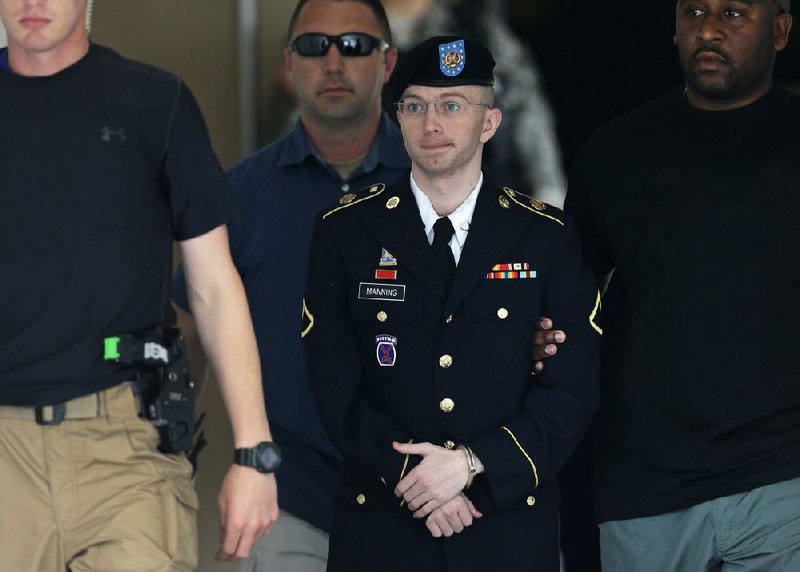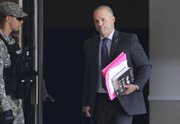FORT MEADE, Md. - U.S. Army Pfc. Bradley Manning was acquitted of aiding the enemy - the most serious charge he faced - but was convicted of espionage, theft and other charges Tuesday, more than three years after he spilled secrets to WikiLeaks.
The judge, Army Col. Denise Lind, deliberated for about 16 hours over three days before she reached her decision in a case that drew worldwide attention as supporters hailed Manning as a whistle-blower. The U.S. government called him an anarchist computer hacker and attention-seeking traitor.
Manning, 25, flanked by his attorneys, stood at attention as the judge read her verdicts. He showed no apparent reaction, but his attorney, David Coombs, smiled faintly when he heard “not guilty” on aiding the enemy, which carried a potential life sentence.
Manning was convicted on 20 of 22 charges, including a guilty plea the government accepted in February. The charges included six counts of violating the Espionage Act, five of stealing government property, and one violation of the Computer Fraud and Abuse Act.
Manning also was found guilty of various lesser charges, including multiple counts of disobeying orders. He faces up to 136 years in prison.
The sentencing phase in the court-martial will begin today with more than 20 witnesses each for the prosecution and the defense. It could last weeks; there is no minimum sentence in the military justice system. Subsequent appeals could take years, legal specialists said.
After the verdict, Coombs exited the court to a round of applause and shouts of “thank you” from a few dozen Manning supporters.
“We won the battle; now we need to go win the war,” Coombs said of the sentencing phase. “Today is a good day, but Bradley is by no means out of the fire.”
Manning’s court-martial was unusual because he acknowledged giving the anti-secrecy website more than 700,000 battlefield reports and diplomatic cables, and video of a 2007 U.S. helicopter attack that killed civilians in Iraq, including a Reuters news photographer and his driver.
Besides his acquittal on the aiding-the-enemy charge, Manning was also found innocent of an espionage charge because the judge found prosecutors had not proved their assertion that Manning started giving material to WikiLeaks in late 2009. Manning said he started the leaks in February the next year.
Manning pleaded guilty earlier this year to lesser offenses that could have sent him to prison for 20 years, yet the government continued to pursue the more serious charges.
During a pretrial hearing in February, Manning said that he leaked the material to expose the U.S military’s “bloodlust” and disregard for human life, and what he considered American diplomatic deceit. He chose information he believed would not the harm the United States, he said, and he wanted to start a debate on military and foreign policy. He did not testify at his court-martial.
Coombs portrayed Manning as a “young, naive but good-intentioned” soldier who was in emotional turmoil, partly because he was a gay service member at a time when homosexuals were barred from serving openly in the U.S. military.
Manning could have sold the information or given it directly to the enemy, Coombs said, but he gave it to WikiLeaks in an attempt to “spark reform” and provoke debate. Counterintelligence witnesses estimated the value of the Iraq and Afghanistan war logs at about $5.7 million.
Manning had no way of knowing whether al-Qaida would access the secret-spilling website, Coombs said, and a 2008 counterintelligence report showed the government itself didn’t know much about the site.
The government said Manning had sophisticated security training and broke signed agreements to protect the secrets. He even had to give a presentation on operational security during his training after he got in trouble for posting a YouTube video about what he was learning.
The lead prosecutor, Maj. Ashden Fein, said Manning knew al-Qaida would see the material, a key point prosecutors needed to prove for an aiding-the-enemy conviction. Osama bin Laden had some of the digital files at his compound when he was killed.
Some of Manning’s supporters attended nearly every day of the two-month trial, many of them protesting outside the Fort Meade gates each day before the court-martial. They wore T-shirts with the word “truth” on them, and blogged, tweeted and raised money for Manning’s defense. One supporter was banned from the trial because the judge said he made online threats.
Hours before the verdict, about two dozen demonstrators gathered outside the gates of the military post, proclaiming their admiration for Manning.
“He wasn’t trying to aid the enemy. He was trying to give people the information they need so they can hold their government accountable,” said Barbara Bridges of Baltimore.
At a news conference Tuesday, WikiLeaks founder Julian Assange blasted the verdict, calling it “a dangerous precedent and an example of national security extremism.”
“This has never been a fair trial,” Assange told journalists gathered at the Ecuadorean Embassy in London.
The court-martial unfolded as another low-level intelligence worker, Edward Snowden, revealed U.S. secrets about surveillance programs. Snowden, a civilian employee, told The Guardian his motives were similar to Manning’s, but he said his leaks were more selective.
Manning’s supporters believed a conviction for aiding the enemy would have a chilling effect on leakers who want to expose wrongdoing by publicizing secret information.
Before Snowden, Manning’s case was the most high-profile espionage prosecution for the Obama administration, which has been criticized for its crackdown on leakers.
The WikiLeaks case is by far the most voluminous release of classified material in U.S. history. Manning’s supporters included Pentagon Papers leaker Daniel Ellsberg, who in the early 1970s spilled a secret Defense Department history of U.S. involvement in Vietnam.
The 7,000 pages of the Pentagon Papers showed that the U.S. government repeatedly misled the public about the Vietnam War.
Ellsberg said Tuesday that Manning’s acquittal on aiding the enemy was more significant than his convictions on the other counts. Most people wouldn’t want to risk life imprisonment, or even execution - a permissible penalty under the law - for exposing government secrets, he said.
“American democracy just dodged a bullet, a possibly fatal bullet,” Ellsberg said. “I’m talking about the free press that I think is the life’s blood of the democracy.”
The free press is still under attack, though, by the Obama administration’s aggressive prosecution of leakers, he said. Other Manning supporters expressed similar thoughts.
The advocacy group Reporters Without Borders said the verdict is a warning to whistle-blowers, “against whom the Obama administration has been waging an unprecedented offensive,” and threatens the future of investigative journalism because intimidated sources might fall quiet.
Glenn Greenwald, the journalist, commentator and former civil-rights lawyer who first reported Snowden’s leaks of National Security Agency surveillance programs, said Manning’s acquittal on the charge of aiding the enemy represented a “tiny sliver of justice.”
Steve Aftergood, the director of the project on government secrecy for the Federation of American Scientists, called the outcome “a weighty verdict that the prosecution would count as a win” but argued that the “larger significance of the case” might be limited.
“The unauthorized disclosures that Manning committed were completely unprecedented in their scope and volume,” he said. “Most investigative journalism does not involve the wholesale publication of confidential records, so the impact of these verdicts on working journalists may be confined. It’s not good news for journalism, but it’s not the end of the world either.”
The material WikiLeaks began publishing in 2010 documented complaints of abuses against Iraqi detainees, a U.S. tally of civilian deaths in Iraq, and America’s weak support for the government of Tunisia - a disclosure that Manning supporters said helped trigger the Middle Eastern pro-democracy uprisings known as the Arab Spring.
The Obama administration said the release threatened to expose valuable military and diplomatic sources, and strained America’s relations with other governments.
Prosecutors said during the trial that Manning relied on WikiLeaks and its founder for guidance on what secrets to “harvest” for the organization, starting within weeks of his arrival in Iraq in late 2009.
Federal authorities are looking into whether Assange can be prosecuted. He has been holed up in the Ecuadorean Embassy in London to avoid extradition to Sweden on sex-crimes allegations.
After the verdicts were read Tuesday, Assange said that Manning’s conviction on espionage and other charges shows that journalists must fight to keep their sources safe and urged media organizations to follow his group’s lead in advocating aggressively on behalf of leakers.
“It is an obligation on all journalists to protect their sources - technically if possible - and provide some legal and political support,” he said. “It’s an obligation of all journalistic organizations to hold the line.”
Assange took no comfort from Manning’s acquittal on aiding the enemy, he said, a ruling that was a “red herring” intended to distract from his conviction on nearly every other charge.
“It can never be that supplying true information to the public is espionage,” Assange insisted, describing the conviction as a hideous precedent that would spell the “end of national security journalism in the United States.”
Assange also worried that judgment had helped lay the ground for his own eventual prosecution in the United States, adding that - although Manning himself admitted passing hundreds of thousands of classified documents to WikiLeaks - the group was still steering clear of claiming him as its source.
Nevertheless, he was full of praise for the young private, calling him a “hero” who had put his liberty and his life on the line to expose wrongdoing.
In Washington, the Republican and Democratic leaders of the House Intelligence Committee joined in a statement declaring “justice has been served today.”
“Manning harmed our national security, violated the public’s trust, and now stands convicted of multiple serious crimes,” said Rep. Mike Rogers of Michigan, chairman of the House Intelligence committee, and Rep. C.A. Dutch Ruppersberger of Maryland, the panel’s top Democrat.
Rep. Howard “Buck” McKeon, R-Calif., chairman of the House Armed Services Committee, also welcomed the trial’s outcome.
“Bradley Manning endangered the security of the United States and the lives of his own comrades in uniform when he intentionally disclosed vast amounts of classified data,” he said. “His conviction should stand as an example to those who are tempted to violate a sacred public trust in pursuit of notoriety, fame or their own political agenda.”
But despite dire American warnings of catastrophic damage dealt by the leaks, Assange said, the U.S. had yet to identify a single person hurt.
“Not a single person came to harm as the result of Bradley Manning’s activities,” he said. “The only victim was the U.S. government’s wounded pride.”
Information for this article was contributed by David Dishneau, Pauline Jelinek, Raphael Satter, Calvin Woodward and Donna Cassata of The Associated Press and by Charlie Savage of The New York Times.
Front Section, Pages 1 on 07/31/2013



